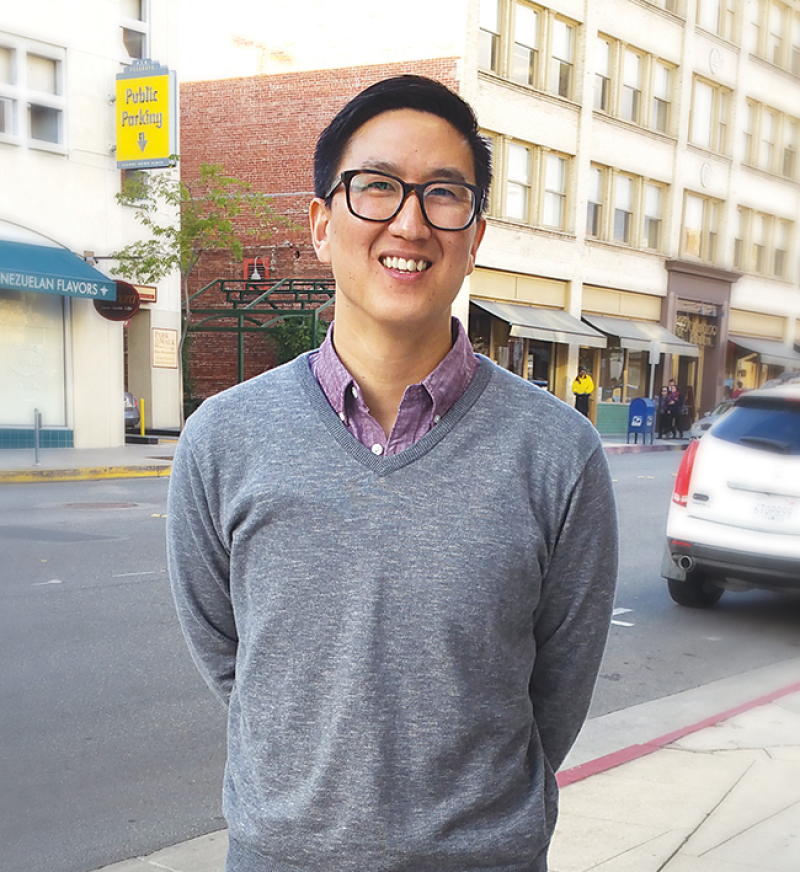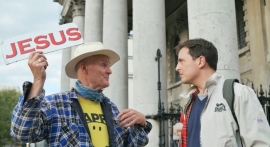

Rev. Ronnie Park is the lead pastor for the English congregation at Good Stewards Church.
Reverend Ronnie Park credits his deep love for the Korean immigrant church to the positive models that he found in older Korean pastors throughout his professional and personal life. Park is the lead pastor of the English congregation at Good Stewards Church.
Park's ties with first generation Korean pastors begin within his own family. His grandfather, Reverend Young Chang Park, and his father, Reverend Young Nam Park, are both pastors, and fall under the "first generation" category in the sense that both of them were born in Korea and immigrated to the U.S. His grandfather in particular was a renowned pastor within the Korean community, as he was active in the Korean independence movement during the Japanese colonial rule in Korea.
"My grandfather is my greatest hero," Park said.
"He instilled in me the value of being Korean, and what it means to be a minister "¦ When he found out that I wanted to go into ministry, he went all out, telling me, "You have to do this, do that, dress this way, etc.,'" Park recalled.
From an outsider's perspective, some of his grandfather's demands may have seemed harsh, but Park said he appreciated all of it.
"He's 100 years old. He can tell me anything he wants to and I should listen to him," he explained. "I tried to take in everything he told me in a way that would benefit me, because number one, he's my hero, number two, he's 100 years old, and number three, he loves me and wants the best for me."
Even outside of his family, Park had only good things to say about the older Korean pastors that he has worked with during his career. Park started out as an intern youth pastor at Oriental Mission Church, during which time he served under Reverend Joshua Choon Min Kang, who was the senior pastor at the time. Kang spoke to Park in English, raised support for Park's education, and invited Park to his home for meals.
"He was the senior pastor of one of the biggest churches at the time, and here he was speaking to an intern pastor in English and clearing my plate," said Park. "He was my first example of a senior pastor and I thought this was normal."
Park also spoke highly of the founding and current senior pastors of Good Stewards Church. Reverend Timothy Kwang Il Song, the founding pastor, Park described as being "so humble, so personable," " a servant," and "one of those men you want to be like." And Park described Reverend Byung Joo Song, the current senior pastor, as one with a "different level of ministry drive" and as a "gifted vision caster and leader." With both pastors, Park has had ample communication. The founding pastor spoke to Park in English and even held pastoral staff meetings in English. And the current pastor also tries to speak to Park in English, while Park tries to speak to him in Korean.
But his experiences in pastoring weren't all "a bed of roses," as Park put it. He also had his seasons of difficulties "” yet, he says, his difficulties weren't specific to an immigrant church context.
When Park took on the role as the lead EM pastor at Good Stewards eight and a half years ago, he was actually tasked with beginning a ministry from the ground up. Previously, Good Stewards had had a relationship with Good News Chapel "” a previous EM in Good Stewards that became an independent church. The two churches had shared the same campus, and Good News Chapel became the next ministry destination for the youth students at Good Stewards after graduating from high school. But when Good News Chapel decided to become completely independent, Good Stewards suddenly became in need of an English ministry and an EM pastor.
And as the only full-time education pastor at the time, Park was asked to take on the role. Up until that point, Park had served as a youth pastor and then as the education pastor at Good Stewards.
Taking on a lead pastoral role challenged him to open up to the congregation and to minister on a much deeper level than he was used to, Park explained. And that deeper level of intimacy also put him at greater risk of getting hurt.
"When you're starting something new like this, and one, two, three people start leaving, it's a big deal," he said, because "you have all these high hopes."
Park described this season as simply a "part of being a pastor," regardless of what kind of context he may have been.
"That's just a part of ministry," Park said. "If you want to be a minister, you need to be ready to get hurt. That's not just a thing about the immigrant church. Being hurt is a part of being a minister. The hurts have nothing to do with it being a first generation and second generation issue."
This is a point that Park emphasizes - that he hopes Korean American pastors would be able to differentiate their difficulties in the church from the "cultural versus the individual." He said he tries to tell people around him his stories of positive experiences with older pastors in the Korean immigrant church to show that there are indeed individuals in the cultural context of the first generation who serve as positive role models for younger pastors.
"There are people out there who have legitimately been hurt and wronged by older pastors," Park elaborated. But they have to ask whether the wrongdoing was a result of the culture or because he or she simply had a bad boss, Park said.
"We can't generalize what our experience was like with one person to an entire group of people," he added.
"I think when you go into something with preconceived notions, it's easy to see it in a bad way. You can think of the hierarchical nature of an immigrant church, or being asked to go to dawn prayer, in a bad way. But for me, it's like, of course church is hierarchical - even non-Korean churches are hierarchical. And you can see dawn prayer as a legalistic thing, or you can see it as a sign of how devoted the older generation is to prayer. They're praying in a way that the whole world is acknowledging," explained Park. He added that he admires the "get-it-done" attitude of the older generation - an attitude that they will do whatever they feel convicted about, no matter how impossible or costly it seems.
"They're going to get it done, period. They're going to build the church building, period," he elaborated. "They're going to go to Mexico, even if they don't know Spanish - they will do it. They're going to do homeless outreach ministry even if they don't know English. It's not practical, per se, but they're going to do it. They're willing to make the sacrifice because they believe it's honoring to God."
"There are so many things that the immigrant church has to offer that I hope our generation is not missing out on because of being jaded," he continued. "There's a rich spiritual heritage that we have in the Korean immigrant church."

















